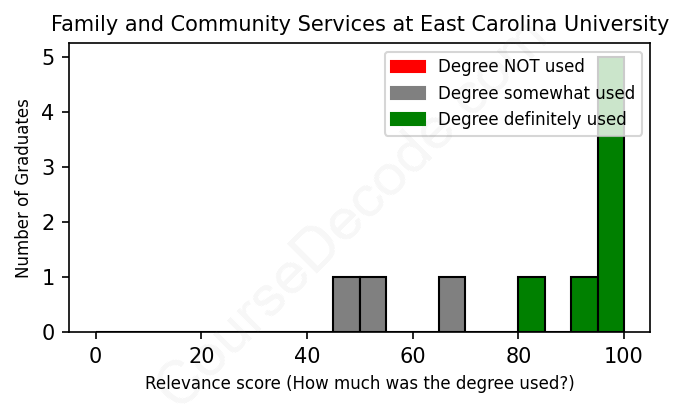
First, some facts. Of the Family and Community Services graduates from East Carolina University we've analyzed , here's how many have used (or NOT used) their degree in their career:

These are estimates based on AI analysis of 10 LinkedIn profiles (see below).
The verdict? Significantly above average. Overall, with an average relevance score of 83%, Family and Community Services graduates from East Carolina University have a much higher likelihood (+16%) of finding work in this field compared to the average graduate across all fields:
And for comparison, here's the chart for all profiles we've looked at across all degrees.
Also, after graduating, 40% of these graduates have pursued further education other than another Bachelor's degree (such as a Masters degree or other), compared to the average across all profiles of 35%. This suggests you may need more than just a Bachelors degree to be competitive as a Family and Community Services graduate.
See the details:
|
Relevance score: 100% We think this person has gone into a career highly relevant to their degree. We think this person has gone into a career highly relevant to their degree.
DEGREE INFOGraduated in 2015 from East Carolina University with a Bachelor's degree in Family and Community Services. No other secondary education since. JOB HISTORY SINCE GRADUATIONToddler and Pre-K Teacher Goddard School Wake Forest Dec 2015 - Mar 2018 Assistant Director  The Goddard School Mar 2018 - Jul 2021 ABOUTNo information provided. |
The top 10 most common jobs done by the graduates we've analyzed (ranked most common to least) are:
From the LinkedIn profiles you've analyzed, it looks like a lot of graduates who studied Family and Community Services at East Carolina University have ended up in positions closely related to education and community support. A majority of them have worked as pre-kindergarten teachers in various schools, which makes sense because their degree equips them with the skills needed in early childhood education and family engagement. For example, positions like NC Prek Teacher and Toddler and Pre-K Teacher not only use their foundational knowledge in child development but also foster relationships with families, which is a key aspect of their studies.
Additionally, there are roles like Family Services Specialist or Crisis Counselor that are even more closely tied to the principles of community service, social work, and mental health support, emphasizing direct work with families facing challenges. However, some positions, like server or military officer, stray from the core focus of Family and Community Services and don’t utilize the related skills from their education. Overall, it seems that many graduates have landed jobs that align well with their degree, especially in educational or community-oriented settings, while a few have taken paths that don’t directly relate to their studies.
Here is a visual representation of the most common words in job titles for Family and Community Services graduates (this is across all Family and Community Services graduates we've analyzed, not just those who went to East Carolina University):

Graduates from East Carolina University with a degree in Family and Community Services seem to have a pretty solid trajectory in their careers, especially in the field of education and social services. For many, especially those who graduated around 2012-2015, their first jobs after graduation often included roles like preschool teachers or assistant teachers. This makes a lot of sense since they are applying their degree directly to work involving children and families right out of college. Over time, many of these graduates progressed into more responsible positions, like lead teachers or even administrative roles within educational settings. For example, one graduate became the Assistant Director after working as a teacher for a few years. This shows a clear pathway for advancement within the field.
Looking at those who are further along—around 5 to 10 years post-graduation—many seem to have settled into roles related to family services, counseling, and support within community organizations. For instance, there are individuals working as Family Services Specialists and social workers, which indicates a good alignment with their degree. However, it's worth noting that not everyone stayed strictly within the family and community services sector. Some moved into more generalized roles or ventured into different fields, showing a mix of success and branching out. Overall, while the graduates generally found relevant jobs in fields connected to their studies, there are also paths that lead them in unexpected directions. But the common theme is a solid foundation for growth in family-centered roles!
Honestly, a Bachelor’s degree in Family and Community Services at East Carolina University isn’t considered overly difficult, especially compared to some of the more intense science or engineering programs. It tends to focus on social sciences, psychology, and community engagement, so if you enjoy working with people and have a knack for understanding social issues, you might find the coursework pretty manageable. Sure, there are some challenging topics and projects, but overall, the program is designed to be accessible and supportive. So, if you're interested in helping families and communities, you’ll likely find it engaging rather than stress-inducing!
Most commonly, in the LinkedIn profiles we've looked at, it takes people 4 years to finish a Bachelor degree in Family and Community Services.
So, looking at these jobs from the Family and Community Services graduates at East Carolina University, it seems like most of them are pretty solidly in the lower to mid-level salary range, especially early in their careers with a lot of teaching and support roles. Jobs like preschool teachers often start off at a lower pay scale, and while those in roles like a care coordinator or crisis counselor might earn a bit more, it doesn't always stack up to other fields. There are a few exceptions—like the ones who got into management roles at schools or advanced into positions with more responsibility—but overall, it looks like many of these grads are making decent money for entry-level positions but might not be raking in the big bucks just yet.
Here is a visual representation of the most common words seen in the "about" section of LinkedIn profiles who have a Bachelor degree in Family and Community Services (this is across all Family and Community Services graduates we've analyzed, not just those who went to East Carolina University). This may or may not be useful:

Here are all colleges offering a Bachelor degree in Family and Community Services (ordered by the average relevance score of their Family and Community Services graduates, best to worst) where we have analyzed at least 10 of their graduates:
| College | Score | Count |
|---|---|---|
 East Carolina University East Carolina University
|
83 | 10 |